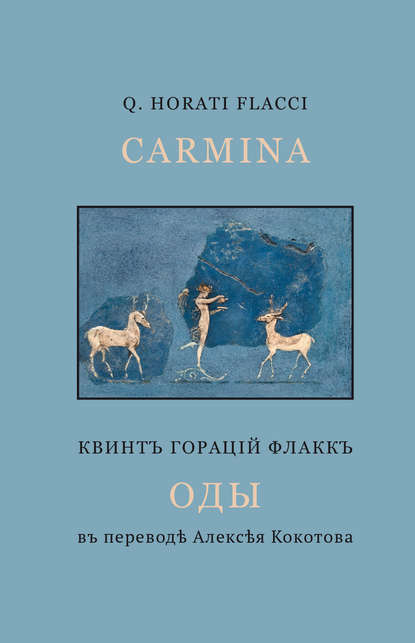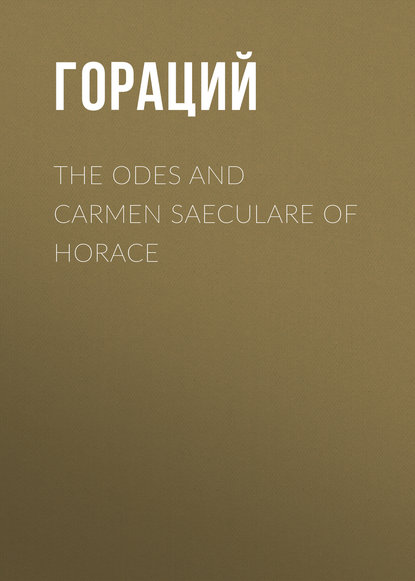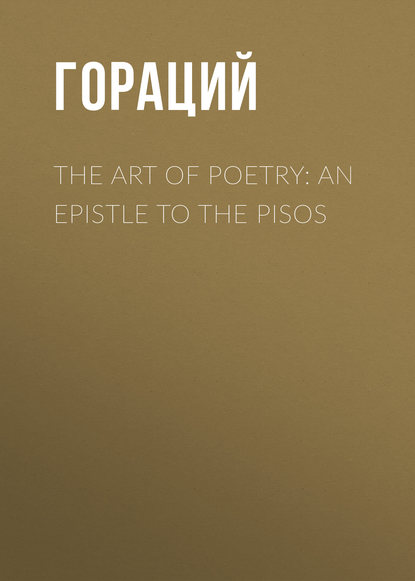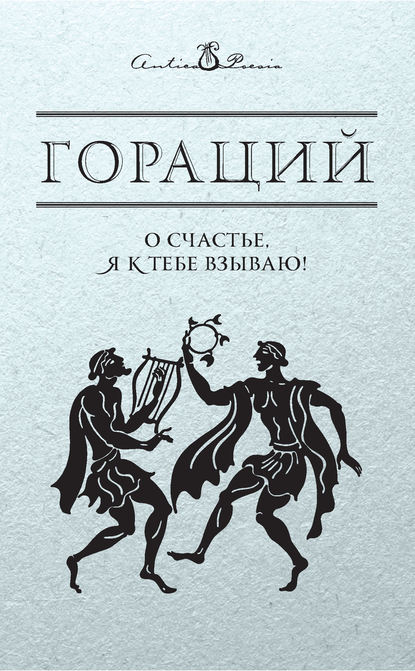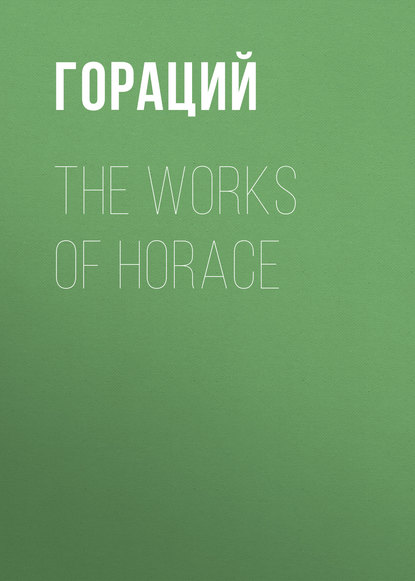 Полная версия
Полная версия- Рейтинг Литрес:5
Полная версия:
Квинт Гораций Флакк The Works of Horace
- + Увеличить шрифт
- - Уменьшить шрифт

Horace
The Works of Horace
THE FIRST BOOK OF THE ODES OF HORACE
ODE I.
TO MAECENAS.
Maecenas, descended from royal ancestors, O both my protection and my darling honor! There are those whom it delights to have collected Olympic dust in the chariot race; and [whom] the goal nicely avoided by the glowing wheels, and the noble palm, exalts, lords of the earth, to the gods.
This man, if a crowd of the capricious Quirites strive to raise him to the highest dignities; another, if he has stored up in his own granary whatsoever is swept from the Libyan thrashing floors: him who delights to cut with the hoe his patrimonial fields, you could never tempt, for all the wealth of Attalus, [to become] a timorous sailor and cross the Myrtoan sea in a Cyprian bark. The merchant, dreading the south-west wind contending with the Icarian waves, commends tranquility and the rural retirement of his village; but soon after, incapable of being taught to bear poverty, he refits his shattered vessel. There is another, who despises not cups of old Massic, taking a part from the entire day, one while stretched under the green arbute, another at the placid head of some sacred stream.
The camp, and the sound of the trumpet mingled with that of the clarion, and wars detested by mothers, rejoice many.
The huntsman, unmindful of his tender spouse, remains in the cold air, whether a hart is held in view by his faithful hounds, or a Marsian boar has broken the fine-wrought toils.
Ivy, the reward of learned brows, equals me with the gods above: the cool grove, and the light dances of nymphs and satyrs, distinguish me from the crowd; if neither Euterpe withholds her pipe, nor Polyhymnia disdains to tune the Lesbian lyre. But, if you rank me among the lyric poets, I shall tower to the stars with my exalted head.
ODE II.
TO AUGUSTUS CAESAR
Enough of snow and dreadful hail has the Sire now sent upon the earth, and having hurled [his thunderbolts] with his red right hand against the sacred towers, he has terrified the city; he has terrified the nations, lest the grievous age of Pyrrha, complaining of prodigies till then unheard of, should return, when Proteus drove all his [marine] herd to visit the lofty mountains; and the fishy race were entangled in the elm top, which before was the frequented seat of doves; and the timorous deer swam in the overwhelming flood. We have seen the yellow Tiber, with his waves forced back with violence from the Tuscan shore, proceed to demolish the monuments of king [Numa], and the temples of Vesta; while he vaunts himself the avenger of the too disconsolate Ilia, and the uxorious river, leaving his channel, overflows his left bank, notwithstanding the disapprobation of Jupiter.
Our youth, less numerous by the vices of their fathers, shall hear of the citizens having whetted that sword [against themselves], with which it had been better that the formidable Persians had fallen; they shall hear of [actual] engagements. Whom of the gods shall the people invoke to the affairs of the sinking empire? With what prayer shall the sacred virgins importune Vesta, who is now inattentive to their hymns? To whom shall Jupiter assign the task of expiating our wickedness? Do thou at length, prophetic Apollo, (we pray thee!) come, vailing thy radiant shoulders with a cloud: or thou, if it be more agreeable to thee, smiling Venus, about whom hover the gods of mirth and love: or thou, if thou regard thy neglected race and descendants, our founder Mars, whom clamor and polished helmets, and the terrible aspect of the Moorish infantry against their bloody enemy, delight, satiated at length with thy sport, alas! of too long continuance: or if thou, the winged son of gentle Maia, by changing thy figure, personate a youth upon earth, submitting to be called the avenger of Caesar; late mayest thou return to the skies, and long mayest thou joyously be present to the Roman people; nor may an untimely blast transport thee from us, offended at our crimes. Here mayest thou rather delight in magnificent triumphs, and to be called father and prince: nor suffer the Parthians with impunity to make incursions, you, O Caesar, being our general.
ODE III.
TO THE SHIP, IN WHICH VIRGIL WAS ABOUT TO SAIL TO ATHENS.
So may the goddess who rules over Cyprus; so may the bright stars, the brothers of Helen; and so may the father of the winds, confining all except Iapyx, direct thee, O ship, who art intrusted with Virgil; my prayer is, that thou mayest land him safe on the Athenian shore, and preserve the half of my soul. Surely oak and three-fold brass surrounded his heart who first trusted a frail vessel to the merciless ocean, nor was afraid of the impetuous Africus contending with the northern storms, nor of the mournful Hyades, nor of the rage of Notus, than whom there is not a more absolute controller of the Adriatic, either to raise or assuage its waves at pleasure. What path of death did he fear, who beheld unmoved the rolling monsters of the deep; who beheld unmoved the tempestuous swelling of the sea, and the Acroceraunians—ill-famed rocks?
In vain has God in his wisdom divided the countries of the earth by the separating ocean, if nevertheless profane ships bound over waters not to be violated. The race of man presumptuous enough to endure everything, rushes on through forbidden wickedness.
The presumptuous son of Iapetus, by an impious fraud, brought down fire into the world. After fire was stolen from the celestial mansions, consumption and a new train of fevers settled upon the earth, and the slow approaching necessity of death, which, till now, was remote, accelerated its pace. Daedalus essayed the empty air with wings not permitted to man. The labor of Hercules broke through Acheron. There is nothing too arduous for mortals to attempt. We aim at heaven itself in our folly; neither do we suffer, by our wickedness, Jupiter to lay aside his revengeful thunderbolts.
ODE IV.
TO SEXTIUS.
Severe winter is melted away beneath the agreeable change of spring and the western breeze; and engines haul down the dry ships. And neither does the cattle any longer delight in the stalls, nor the ploughman in the fireside; nor are the meadows whitened by hoary frosts. Now Cytherean Venus leads off the dance by moonlight; and the comely Graces, in conjunction with the Nymphs, shake the ground with alternate feet; while glowing Vulcan kindles the laborious forges of the Cyclops. Now it is fitting to encircle the shining head either with verdant myrtle, or with such flowers as the relaxed earth produces. Now likewise it is fitting to sacrifice to Faunus in the shady groves, whether he demand a lamb, or be more pleased with a kid. Pale death knocks at the cottages of the poor, and the palaces of kings, with an impartial foot. O happy Sextius! The short sum total of life forbids us to form remote expectations. Presently shall darkness, and the unreal ghosts, and the shadowy mansion of Pluto oppress you; where, when you shall have once arrived, you shall neither decide the dominion of the bottle by dice, nor shall you admire the tender Lycidas, with whom now all the youth is inflamed, and for whom ere long the maidens will grow warm.
ODE V.
TO PYRRHA.
What dainty youth, bedewed with liquid perfumes, caresses you, Pyrrha, beneath the pleasant grot, amid a profusion of roses? For whom do you bind your golden hair, plain in your neatness? Alas! how often shall he deplore your perfidy, and the altered gods; and through inexperience be amazed at the seas, rough with blackening storms who now credulous enjoys you all precious, and, ignorant of the faithless gale, hopes you will be always disengaged, always amiable! Wretched are those, to whom thou untried seemest fair? The sacred wall [of Neptune's temple] demonstrates, by a votive tablet, that I have consecrated my dropping garments to the powerful god of the sea.
ODE VI.
TO AGRIPPA.
You shall be described by Varius, a bird of Maeonian verse, as brave, and a subduer of your enemies, whatever achievements your fierce soldiery shall have accomplished, under your command; either on ship-board or on horseback. We humble writers, O Agrippa, neither undertake these high subjects, nor the destructive wrath of inexorable Achilles, nor the voyages of the crafty Ulysses, nor the cruel house of Pelops: while diffidence, and the Muse who presides over the peaceful lyre, forbid me to diminish the praise of illustrious Caesar, and yours, through defect of genius. Who with sufficient dignity will describe Mars covered with adamantine coat of mail, or Meriones swarthy with Trojan dust, or the son of Tydeus by the favor of Pallas a match for the gods? We, whether free, or ourselves enamored of aught, light as our wont, sing of banquets; we, of the battles of maids desperate against young fellows—with pared nails.
ODE VII.
TO MUNATIUS PLANCUS.
Other poets shall celebrate the famous Rhodes, or Mitylene, or Ephesus, or the walls of Corinth, situated between two seas, or Thebes, illustrious by Bacchus, or Delphi by Apollo, or the Thessalian Tempe. There are some, whose one task it is to chant in endless verse the city of spotless Pallas, and to prefer the olive culled from every side, to every other leaf. Many a one, in honor of Juno, celebrates Argos, productive of steeds, and rich Mycenae. Neither patient Lacedaemon so much struck me, nor so much did the plain of fertile Larissa, as the house of resounding Albunea, and the precipitately rapid Anio, and the Tiburnian groves, and the orchards watered by ductile rivulets. As the clear south wind often clears away the clouds from a lowering sky, now teems with perpetual showers; so do you, O Plancus, wisely remember to put an end to grief and the toils of life by mellow wine; whether the camp, refulgent with banners, possess you, or the dense shade of your own Tibur shall detain you. When Teucer fled from Salamis and his father, he is reported, notwithstanding, to have bound his temples, bathed in wine, with a poplar crown, thus accosting his anxious friends: "O associates and companions, we will go wherever fortune, more propitious than a father, shall carry us. Nothing is to be despaired of under Teucer's conduct, and the auspices of Teucer: for the infallible Apollo has promised, that a Salamis in a new land shall render the name equivocal. O gallant heroes, and often my fellow-sufferers in greater hardships than these, now drive away your cares with wine: to-morrow we will re-visit the vast ocean."
ODE VIII.
TO LYDIA.
Lydia, I conjure thee by all the powers above, to tell me why you are so intent to ruin Sybaris by inspiring him with love? Why hates he the sunny plain, though inured to bear the dust and heat? Why does he neither, in military accouterments, appear mounted among his equals; nor manage the Gallic steed with bitted reins? Why fears he to touch the yellow Tiber? Why shuns he the oil of the ring more cautiously than viper's blood? Why neither does he, who has often acquired reputation by the quoit, often by the javelin having cleared the mark, any longer appear with arms all black-and-blue by martial exercises? Why is he concealed, as they say the son of the sea-goddess Thetis was, just before the mournful funerals of Troy; lest a manly habit should hurry him to slaughter, and the Lycian troops?
ODE IX.
TO THALIARCHUS.
You see how Soracte stands white with deep snow, nor can the laboring woods any longer support the weight, and the rivers stagnate with the sharpness of the frost. Dissolve the cold, liberally piling up billets on the hearth; and bring out, O Thaliarchus, the more generous wine, four years old, from the Sabine jar. Leave the rest to the gods, who having once laid the winds warring with the fervid ocean, neither the cypresses nor the aged ashes are moved. Avoid inquiring what may happen tomorrow; and whatever day fortune shall bestow on you, score it up for gain; nor disdain, being a young fellow, pleasant loves, nor dances, as long as ill-natured hoariness keeps off from your blooming age. Now let both the Campus Martius and the public walks, and soft whispers at the approach of evening be repeated at the appointed hour: now, too, the delightful laugh, the betrayer of the lurking damsel from some secret corner, and the token ravished from her arms or fingers, pretendingly tenacious of it.
ODE X.
TO MERCURY.
Mercury, eloquent grandson of Atlas, thou who artful didst from the savage manners of the early race of men by oratory, and the institution of the graceful Palaestra: I will celebrate thee, messenger of Jupiter and the other gods, and parent of the curved lyre; ingenious to conceal whatever thou hast a mind to, in jocose theft. While Apollo, with angry voice, threatened you, then but a boy, unless you would restore the oxen, previously driven away by your fraud, he laughed, [when he found himself] deprived of his quiver [also]. Moreover, the wealthy Priam too, on his departure from Ilium, under your guidance deceived the proud sons of Atreus, and the Thessalian watch-lights, and the camp inveterate agaist Troy. You settle the souls of good men in blissful regions, and drive together the airy crowd with your golden rod, acceptable both to the supernal and infernal gods.
ODE XI.
TO LEUCONOE.
Inquire not, Leuconoe (it is not fitting you should know), how long a term of life the gods have granted to you or to me: neither consult the Chaldean calculations. How much better is it to bear with patience whatever shall happen! Whether Jupiter have granted us more winters, or [this as] the last, which now breaks the Etrurian waves against the opposing rocks. Be wise; rack off your wines, and abridge your hopes [in proportion] to the shortness of your life. While we are conversing, envious age has been flying; seize the present day, not giving the least credit to the succeeding one.
ODE XII.
TO AUGUSTUS.
What man, what hero, O Clio, do you undertake to celebrate on the harp, or the shrill pipe? What god? Whose name shall the sportive echo resound, either in the shady borders of Helicon, or on the top of Pindus, or on cold Haemus? Whence the woods followed promiscuously the tuneful Orpheus, who by his maternal art retarded the rapid courses of rivers, and the fleet winds; and was so sweetly persuasive, that he drew along the listening oaks with his harmonious strings. But what can I sing prior to the usual praises of the Sire, who governs the affairs of men and gods; who [governs] the sea, the earth, and the whole world with the vicissitudes of seasons? Whence nothing is produced greater than him; nothing springs either like him, or even in a second degree to him: nevertheless, Pallas has acquired these honors, which are next after him.
Neither will I pass thee by in silence, O Bacchus, bold in combat; nor thee, O Virgin, who art an enemy to the savage beasts; nor thee, O Phoebus, formidable for thy unerring dart.
I will sing also of Hercules, and the sons of Leda, the one illustrious for his achievements on horseback, the other on foot; whose clear-shining constellation as soon as it has shone forth to the sailors, the troubled surge falls down from the rocks, the winds cease, the clouds vanish, and the threatening waves subside in the sea—because it was their will. After these, I am in doubt whom I shall first commemorate, whether Romulus, or the peaceful reign of Numa, or the splendid ensigns of Tarquinius, or the glorious death of Cato. I will celebrate, out of gratitude, with the choicest verses, Regulus, and the Scauri, and Paulus, prodigal of his mighty soul, when Carthage conquered, and Fabricius.
Severe poverty, and an hereditary farm, with a dwelling suited to it, formed this hero useful in war; as it did also Curius with his rough locks, and Camillus. The fame of Marcellus increases, as a tree does in the insensible progress of time. But the Julian constellation shines amid them all, as the moon among the smaller stars. O thou son of Saturn, author and preserver of the human race, the protection of Caesar is committed to thy charge by the Fates: thou shalt reign supreme, with Caesar for thy second. Whether he shall subdue with a just victory the Parthians making inroads upon Italy, or shall render subject the Seres and Indians on the Eastern coasts; he shall rule the wide world with equity, in subordination to thee. Thou shalt shake Olympus with thy tremendous car; thou shalt hurl thy hostile thunderbolts against the polluted groves.
ODE XIII.
TO LYDIA.
O Lydia, when you commend Telephus' rosy neck, and the waxen arms of Telephus, alas! my inflamed liver swells with bile difficult to be repressed. Then neither is my mind firm, nor does my color maintain a certain situation: and the involuntary tears glide down my cheek, proving with what lingering flames I am inwardly consumed. I am on fire, whether quarrels rendered immoderate by wine have stained your fair shoulders; or whether the youth, in his fury, has impressed with his teeth a memorial on your lips. If you will give due attention to my advice, never expect that he will be constant, who inhumanly wounds those sweet kisses, which Venus has imbued with the fifth part of all her nectar. O thrice and more than thrice happy those, whom an indissoluble connection binds together; and whose love, undivided by impious complainings, does not separate them sooner than the last day!
ODE XIV.
TO THE ROMAN STATE.
O ship, new waves will bear you back again to sea. O what are you doing? Bravely seize the port. Do you not perceive, that your sides are destitute of oars, and your mast wounded by the violent south wind, and your main-yards groan, and your keel can scarcely support the impetuosity of the waves without the help of cordage? You have not entire sails; nor gods, whom you may again invoke, pressed with distress: notwithstanding you are made of the pines of Pontus, and as the daughter of an illustrious wood, boast your race, and a fame now of no service to you. The timorous sailor has no dependence on a painted stern. Look to yourself, unless you are destined to be the sport of the winds. O thou, so lately my trouble and fatigue, but now an object of tenderness and solicitude, mayest thou escape those dangerous seas which flow among the shining Cyclades.
ODE XV.
TO PARIS.
When the perfidious shepherd (Paris) carried off by sea in Trojan ships his hostess Helen, Nereus suppressed the swift winds in an unpleasant calm, that he might sing the dire fates. "With unlucky omen art thou conveying home her, whom Greece with a numerous army shall demand back again, having entered into a confederacy to dissolve your nuptials, and the ancient kingdom of Priam. Alas! what sweat to horses, what to men, is just at hand! What a destruction art thou preparing for the Trojan nation! Even now Pallas is fitting her helmet, and her shield, and her chariot, and her fury. In vain, looking fierce through the patronage of Venus, will you comb your hair, and run divisions upon the effeminate lyre with songs pleasing to women. In vain will you escape the spears that disturb the nuptial bed, and the point of the Cretan dart, and the din [of battle], and Ajax swift in the pursuit. Nevertheless, alas! the time will come, though late, when thou shalt defile thine adulterous hairs in the dust. Dost thou not see the son of Laertes, fatal to thy nation, and Pylian Nestor, Salaminian Teucer, and Sthenelus skilled in fight (or if there be occasion to manage horses, no tardy charioteer), pursue thee with intrepidity? Meriones also shalt thou experience. Behold! the gallant son of Tydeus, a better man than his father, glows to find you out: him, as a stag flies a wolf, which he has seen on the opposite side of the vale, unmindful of his pasture, shall you, effeminate, fly, grievously panting:—not such the promises you made your mistress. The fleet of the enraged Achilles shall defer for a time that day, which is to be fatal to Troy and the Trojan matrons: but, after a certain number of years, Grecian fire shall consume the Trojan palaces."
ODE XVI.
TO A YOUNG LADY HORACE HAD OFFENDED.
O daughter, more charming than your charming mother, put what end you please to my insulting iambics; either in the flames, or, if you choose it, in the Adriatic. Nor Cybele, nor Apollo, the dweller in the shrines, so shakes the breast of his priests; Bacchus does not do it equally, nor do the Corybantes so redouble their strokes on the sharp-sounding cymbals, as direful anger; which neither the Noric sword can deter, nor the shipwrecking sea, nor dreadful fire, not Jupiter himself rushing down with awful crash. It is reported that Prometheus was obliged to add to that original clay [with which he formed mankind], some ingredient taken from every animal, and that he applied the vehemence of the raging lion to the human breast. It was rage that destroyed Thyestes with horrible perdition; and has been the final cause that lofty cities have been entirely demolished, and that an insolent army has driven the hostile plowshare over their walls. Compose your mind. An ardor of soul attacked me also in blooming youth, and drove me in a rage to the writing of swift-footed iambics. Now I am desirous of exchanging severity for good nature, provided that you will become my friend, after my having recanted my abuse, and restore me your affections.
ODE XVII.
TO TYNDARIS.
The nimble Faunus often exchanges the Lycaean mountain for the pleasant Lucretilis, and always defends my she-goats from the scorching summer, and the rainy winds. The wandering wives of the unsavory husband seek the hidden strawberry-trees and thyme with security through the safe grove: nor do the kids dread the green lizards, or the wolves sacred to Mars; whenever, my Tyndaris, the vales and the smooth rocks of the sloping Ustica have resounded with his melodious pipe. The gods are my protectors. My piety and my muse are agreeable to the gods. Here plenty, rich with rural honors, shall flow to you, with her generous horn filled to the brim. Here, in a sequestered vale, you shall avoid the heat of the dog-star; and, on your Anacreontic harp, sing of Penelope and the frail Circe striving for one lover; here you shall quaff, under the shade, cups of unintoxicating Lesbian. Nor shall the raging son of Semele enter the combat with Mars; and unsuspected you shall not fear the insolent Cyrus, lest he should savagely lay his intemperate hands on you, who are by no means a match for him; and should rend the chaplet that is platted in your hair, and your inoffensive garment.
ODE XVIII.
TO VARUS.
O Varus, you can plant no tree preferable to the sacred vine, about the mellow soil of Tibur, and the walls of Catilus. For God hath rendered every thing cross to the sober; nor do biting cares disperse any otherwise [than by the use of wine]. Who, after wine, complains of the hardships of war or of poverty? Who does not rather [celebrate] thee, Father Bacchus, and thee, comely Venus? Nevertheless, the battle of the Centaurs with the Lapithae, which was fought in their cups, admonishes us not to exceed a moderate use of the gifts of Bacchus. And Bacchus himself admonishes us in his severity to the Thracians; when greedy to satisfy their lusts, they make little distinction between right and wrong. O beauteous Bacchus, I will not rouse thee against thy will, nor will I hurry abroad thy [mysteries, which are] covered with various leaves. Cease your dire cymbals, together with your Phrygian horn, whose followers are blind Self-love and Arrogance, holding up too high her empty head, and the Faith communicative of secrets, and more transparent than glass.
ODE XIX.
TO GLYCERA.
The cruel mother of the Cupids, and the son of the Theban Gemele, and lascivious ease, command me to give back my mind to its deserted loves. The splendor of Glycera, shining brighter than the Parian marble, inflames me: her agreeable petulance, and her countenance, too unsteady to be beheld, inflame me. Venus, rushing on me with her whole force, has quitted Cyprus; and suffers me not to sing of the Scythians, and the Parthian, furious when his horse is turned for flight, or any subject which is not to the present purpose. Here, slaves, place me a live turf; here, place me vervains and frankincense, with a flagon of two-year-old wine. She will approach more propitious, after a victim has been sacrificed.
ODE XX.
TO MAECENAS.
